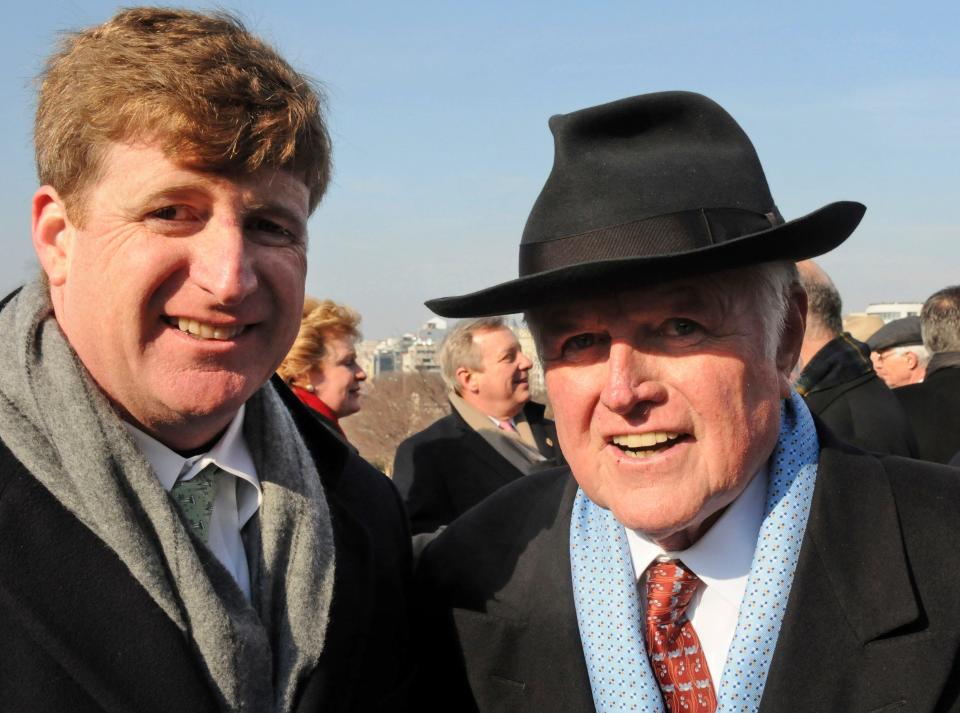Patinkin: Patrick Kennedy is still fighting for mental health — his own and his country's
- Oops!Something went wrong.Please try again later.
- Oops!Something went wrong.Please try again later.
It is just before 6:30 a.m., and Patrick Kennedy, former Rhode Island congressman and nephew of a president, is about to start his remote morning sobriety meeting.
Patrick is now 54 and living in Brigantine, New Jersey, near Atlantic City, with his wife, Amy, and their five children, ages 14 to 4.
So as not to disturb them, Patrick goes into his garage, sits on a beach chair on the concrete floor and opens his iPad. He has been to thousands of AA meetings, but as moderator this day, he wants to get it right, so he has his starting script in hand, next to his morning coffee.
It’s now 16 years since the night that Patrick, who had hidden his addiction and bipolar issues, crashed his car into a barricade outside the Capitol building at 2:45 a.m., disoriented and thinking he was late for a vote after mixing medications for sleep. He knew it was a sign of deeper issues.
Opinion/Kennedy: As a Kennedy, I’ve lived my whole life in the shadow of gun violence

Against the advice of his famous dad, Sen. Ted Kennedy, Patrick went public about his alcohol addiction. It has at times been a tumultuous journey, but he is today one of the country’s foremost mental health advocates. Legislation he created is a key reason that illnesses such as depression, anxiety and addiction are now covered the same as physical disease.
Learning to avoid potential triggers
After a decades-long Rhode Island political presence, it’s been a while since he’s been in the news here, so I decided to catch up with him. My call got him remembering how during his 20s and 30s, he’d be talking to The Providence Journal weekly or more, and he named three or four of our reporters.
Patrick has been off substances for 12 years, but he tells me that, like millions, he has to fight daily for sobriety, with rituals like this recent morning meeting.
More: Remembering Kristen, as first drug dealer is sentenced under the law that bears her name
Soon, about a dozen folks are on that call, and the former congressman is prompting them with familiar questions. What are your challenges? The things you’re grateful for?
In his own case, he thinks of his kids upstairs, and wife, and fulfilling life. He knows he can lose all that were he to start drinking again — even once. For those with this disease, he says, there’s no such thing as one drink.
As the meeting unfolds, folks share moments that are potential triggers, like anger, boredom, stress — and how to keep them at bay. That, says Patrick, is the real key to sobriety — avoiding situations, or mindsets, that make you want to self-medicate.
The session goes an hour, and then he moves to his next daily ritual, exercise, now part of his sobriety discipline. He gets onto a stationary bike, with classic rock in the background — Eagles, Doors, Stevie Nicks. Other days he’ll do a treadmill or swim. Workouts, he explains, spark good brain chemicals that stave off anxiety and depression.
“It inoculates me from stress,” he says.
Rhode Island children in crisis: Why doctors have declared a mental health emergency
Anchored by his wife and children
By now, it is time to drive his kids to their nearby school. That’s important to Patrick, to be an involved dad. He couldn’t do it without his wife, Amy.
“She’s 100% with me on my recovery,” he says.
The two met in 2010 at a mental health forum in Atlantic City when Amy was a middle school teacher. They married a year later at the Kennedy compound in Hyannis Port, with Supreme Court Justice Stephen Breyer officiating. In 2020, Amy made a run for Congress herself in New Jersey, getting the Democratic nomination but losing in a close general election. Today, like Patrick, she does work in the mental health field.

By 8:50 a.m., back home and showered, Patrick begins his own daily work, through his “Kennedy Forum,” an umbrella of advocacy groups. On this day, he starts by recording podcasts, interviewing experts for Psych Hub, which he also co-founded. Occasionally, Patrick likes to showcase celebs known to focus on mental health, including singer Josh Groban.
Patrick went to his first rehab at 17 and didn’t get sober until 42. Today, he feels his work has a greater urgency because of what’s happened to street drugs. Patrick mostly abused alcohol, but also OxyContins. He knows such pills are now often laced with fentanyl.
“There was room for me to relapse and come back,’’ he says. “In this generation, there isn’t as much. I’d be playing Russian roulette with my life. This is a deadly time for someone with an addiction.”

After a few hours, Patrick pauses for lunch — a peanut butter and jelly sandwich — then records remarks for various mental health events. One recent cameo was for a United Nations-sponsored virtual meeting from Italy about the stigma faced in many countries by people in recovery.
Patrick works with local centers as well, including Anchor Recovery in Pawtucket, which helps folks with addiction issues who are looking for jobs, housing and peer support.
Soon, he breaks to help get his kids to their activities — swim, music, basketball and piano practice.
More: 'A crisis': Record number of Rhode Islanders died from accidental drug overdoses in 2021
A disease of forgetting
Afterward, Patrick decides to do a second meeting, this one live, at a nearby Presbyterian Church basement.
Despite 12 years of sobriety, he’ll tell you he still needs to be reminded daily — through the stories of others — of the dangers of relapse.
It also grounds him to connect with folks eye-to-eye. At this gathering, there is, among others, a librarian, a truck driver, a retired couple, a theater lighting tech and a construction worker. It’s a contrast to the sobriety meetings he attended while in Congress, which sometimes drew fellow members and even former generals and Cabinet officials.
A beacon of HOPE amid RI's opioid crisis: Police, addiction specialists team up
At this session, there is talk about addiction being a disease of forgetting — a big danger. One reason people relapse, Patrick says, is that you forget the pain — the lying to those you love, the way it controls your life, the people you let down and the horrible physical sickness during withdrawals. It’s important, he says, to remember such things.
Back in the house, it’s time for dinner, and homework. Patrick puts his phone in a room and shuts the door so he can give full focus to his family.
Breaking the family cycle of addiction
In his book about his journey, “A Common Struggle,” Patrick writes honestly about seeing his famous father, Teddy, drink too much, and his mom as well. He doesn’t want his children to see the same in their dad, and repeat the cycle of addiction. This, he’ll tell you, may be his strongest reason for sobriety.

Later in the evening, as one more helpful ritual, Patrick reaches out to one of those he calls his “close, close-mouthed friends” — folks who have lived the struggle and help each other stay sober.
In this case, it’s Tom Coderre, a former Rhode Island state senator and chief of staff to the Senate president, and now President Joe Biden’s acting deputy assistant secretary of the Substance Abuse and Mental Health Services Administration.
The two share the bond of public figures who got in trouble using, and now have careers fighting to make mental health services accessible without stigma.
More personally, they hold each other to account.
By 9 p.m., Patrick Kennedy and his wife are settling their five children into bed, and soon, it is time for Patrick to retire, too.
As he lies down, he is grateful for another day without using, mindful of how important it was to commit time for his sobriety rituals.
Tomorrow, he will make sure to do the same.
mpatinki@providencejournal.com
This article originally appeared on The Providence Journal: Patrick Kennedy's daily fight to promote mental health

